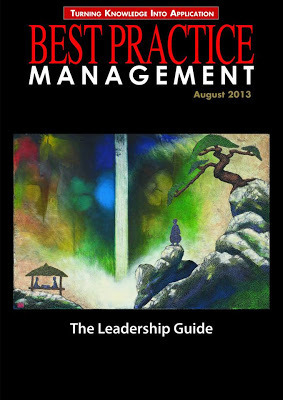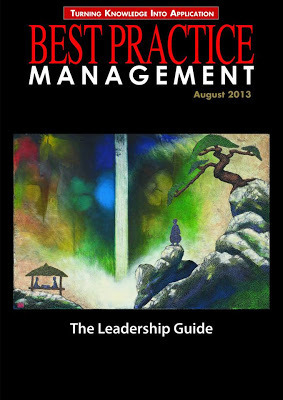Kenneth Atchity's Blog, page 202
August 31, 2013
Tome Tender's Five Star Review of Story Merchant Author Nicolas Bazan's The Dark Madonna
The Dark Madonna: A Fable of Resiliency and Imagination by Nicolas Bazan
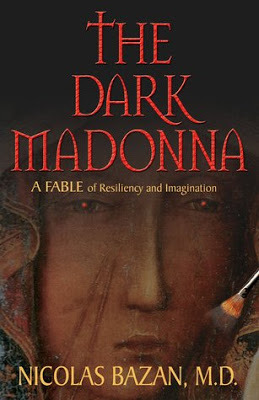
The Dark Madonna
by Nicolas Bazan
My rating: 5 of 5 stars
The Dark Madonna: A Fable of Resiliency and Imagination by Nicolas Bazan
is absolutely mesmerizing with its intriguing blend of fact and
fiction! With few pages, the tale of art forgery, greed, and religious
beliefs and mysteries lead a scholar on a journey across continents and
cultures, that left me wanting more from this brilliant author.
Nicolas Bazan has written with a passionate pen, telling his story in
the first person, deeply emotional and moving, almost like a pilgrimage
of self-discovery and inner awakening as I was taken to ghostly remains
of the German prison camps, where the determination to survive and the
spirit of those who died there could be felt in the air. On visiting
Poland, almost drawn by fate, our main character finds his scientific
expertise put to good use when a sacred relic appearance to be a clever
forgery and a young religious man goes missing. Who is behind this
great deception to the faith of the masses? Will the vandal e found?
Will the relic be found? Were the reasons behind its theft truly evil
or misguided? Can the answer to a religious mystery be found in
science?
Wonderfully entertaining and very well written, this short novella feels
like a much longer work with its attention to detail and deeply thought
out plot.
A review copy was provided by the author in exchange for my honest review and I highly recommend it!

The Dark Madonna
by Nicolas Bazan
My rating: 5 of 5 stars
The Dark Madonna: A Fable of Resiliency and Imagination by Nicolas Bazan
is absolutely mesmerizing with its intriguing blend of fact and
fiction! With few pages, the tale of art forgery, greed, and religious
beliefs and mysteries lead a scholar on a journey across continents and
cultures, that left me wanting more from this brilliant author.
Nicolas Bazan has written with a passionate pen, telling his story in
the first person, deeply emotional and moving, almost like a pilgrimage
of self-discovery and inner awakening as I was taken to ghostly remains
of the German prison camps, where the determination to survive and the
spirit of those who died there could be felt in the air. On visiting
Poland, almost drawn by fate, our main character finds his scientific
expertise put to good use when a sacred relic appearance to be a clever
forgery and a young religious man goes missing. Who is behind this
great deception to the faith of the masses? Will the vandal e found?
Will the relic be found? Were the reasons behind its theft truly evil
or misguided? Can the answer to a religious mystery be found in
science?
Wonderfully entertaining and very well written, this short novella feels
like a much longer work with its attention to detail and deeply thought
out plot.
A review copy was provided by the author in exchange for my honest review and I highly recommend it!

Published on August 31, 2013 12:55
August 30, 2013
August 29, 2013
August 28, 2013
My Addiction Interviews Story Merchant Author S.D. Hines
Interview - S.D. Hines – Author of the Heroines of Classical Greece - Medusa
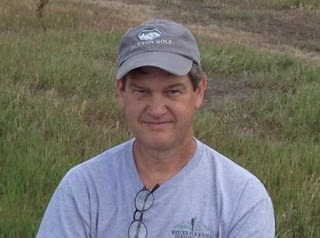
I am always left in awe when I get the opportunity to literally
connect with people on the other side of
the world. The fast click ability always leaves me fascinated as I recall my
initial exposure to a computer just over 15 years ago. PC’s just started coming
into fashion at that stage and going on the internet was still a big -- Wow.
Now here I am today, willing and able to chat to pretty much anyone I set my
sites on.
It is a great honour for me to introduce and interview S.D.
Hines ( from Alaska) the newly published author of the series -- Heroines of Classical Greece, a series I am
sure many readers will grab with much interest.
Scot thanks so much for
granting M.A this interview.
As a start would you mind
giving readers a bit more insight on yourself? What is it that made you decide
to write?
Like
most of your readers, I’m a committed bibliophile. Growing up, I was the
classic nerd who would sneak a flashlight and read under the covers at night.
Even now I have a couple or three novels going at any one time. When I was eventually
forced to grow up, I settled into a medical career and did a great deal of
teaching, often tying in my field (neurologic disease) to the humanities. I
commonly used examples of medical illness that were prominent in many famous
paintings and novels to make a clinical point. One of my favourite topics was
mythology.
I
had written off and on through the years, but nothing too serious. One day, while
contemplating how unfair many of the old myths were to innocent mortals, I
thought “why somebody doesn’t tell the story from their standpoint of view?” Then I realized… that someone could be me.
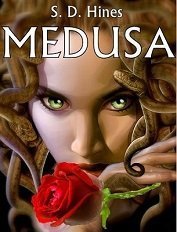
Your first novel revolves
around Medusa. In your intro you gave an intriguing piece on what led you to
write the story. Could you share that with our readers?
Medusa
was a pious priestess who was cursed for resisting Poseidon when he raped her
in Athena’s temple. When I first read this I was mortified. How fair was that?
In almost all modern media such as movies and books, Medusa is cast as an evil
monster. That paradox got me thinking about how the mortal women prominent in
mythology were either monsters, victimized/helpless/inept, or just plain wicked.
Think of Medea (killed her kids from jealousy), Pandora (let the evils of the
world into the world…similar to Eve), the Amazons (brave but always lost to
men: Hercules killed a dozen, one right after the other), and of course,
Medusa.
But
in our daily lives, the real heroes that shape our lives are often women who
persevere despite impediments put in their way by virtue of having an extra “X”
chromosome. Even in the 21st century, women have a tough time
getting a fair shake. My own wife is a neurologic surgeon and despite her
skills and compassion, she must work harder and better than her male
counterparts for acceptance. If things are slow to change even now, imagine
what it was like 3,000 years ago. What did Medusa have to endure? Ariadne?
What makes your story
different from the historical facts that are known to us today?
I
would argue that my story is likely to be closer to fact than the current tales
that evolved through the centuries. My belief is that there were once real events that shook the ancient world
and were passed down verbally to later became our myths. My stories rely more
on proven science and history rather than the mystical to explain the origin of
these tales. Some myths say that Poseidon destroyed Atlantis. I say that it was
a shifting of tectonic plates. Was a giant an twisted creature descended from
unholy deities, or was he an acromegalic shaped by an excess of growth hormone?
Was the bull of Marathon a monster, or rather an ice age remnant, a prehistoric
auroch? I am a firm believer that science is far more magical than shrugging off
something unexplained as being the work of the gods.
In
my stories, the gods are present, but they are shadowy figures with peripheral
roles. The true heroes are the men and women of the stories. Just like today.
Why focus on Classical
Greek heroines?
At
the risk of sounding parochial, I would argue that like it or not, and for better
or worse, Western culture has permeated our world, particularly the media
(print and all others). Ancient Greece shapes our politics, our science, our
philosophy, or religion, our ____ (fill in the blank).
So
Greek Mythology is a universal theme. It is a clear "winner" in terms
of a genre with potential interest to all, if done right. Why pick the heroines
instead of the heroes of Ancient Greece? Quite frankly, the heroines were more
complex, more intelligent, and more...heroic.
I
was fortunate enough to meet Ken Atchity (storymerchant.com and others), author
of THE MESSIAH MATRIX, who patiently shepherded me through the bewildering
world of publication. I later found out that in addition to his impressive
literary credits, Dr. Atchity is a Fulbright Scholar and a recognized expert in
classic literature.
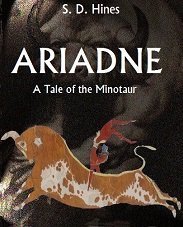
Why is it that Medusa’s
story – which according to your research was initially sympathetic towards her situation
- changed at a later stage to the extent of her being condemned?
Scholars
find that the most ancient version of Medusa's tale suggest that after having
been horribly savaged and cursed by Poseidon, she was a sympathetic figure. There
were even some shrines to Medusa, and I shudder to imagine the circumstances
that would drive some to seek these sites of worship. But over time as Greece
prospered, Medusa took on a role as a monster who somehow deserved the curse. Some theorize that with a more sophisticated
culture and more economic opportunities, women had potential of a role other
that of child-bearing and child-rearing. To stave off competition, her role
changed to give a moral lesson as to the inferiority of women. As I mentioned,
within this same time period almost every mortal female figure in mythology had
weak morals, was evil, or failed attempting to imitate the glory of her male
counterparts.
Your second novel in the
series is now available on Amazon. From having released the first to now
launching the second how have readers responded?
ARIADNE:
A Tale of the Minotaur was actually launched first, even though it was the
second penned (the order of the series doesn't matter). It was shorter, and was
a fast moving, exciting tale that we thought it would be a better one to get
out initially. It had a potential appeal to a YA (young adult) audience as
well, since it essentially is the ancient version of The Hunger Games. The book is doing very well. It has even more
of modern science within, in an easily understandable way. As one reviewer
said, it has more twists and turns than the Labyrinth. But when you read
it...beware. All your preconceived notions of the story of Ariadne, Theseus,
and the Minotaur will be shattered.
How have critics responded
towards your take on history?
So
far it's been positive, but I don't doubt that I'll get some objections from
some that prefer the original stories dating from thousands of years ago. But
my history matches up quite accurately, and I try to take as little poetic
licence as possible. Let's just say that if my stories aren't accurate
portrayals of what actually happened, they should have been ;) Gregory Maguire
did something similar when he took the classic tale of Baum’s THE WIZARD OF OZ
and fleshed out WICKED from its literary bones. Although I try and include as
much proven research in the books as possible, when you come down to it, the
genre of "Mythic Fiction" is essentially "Fiction".
How many novels will you
aim to cover in this series?
That’s
an excellent question. Two down and one in progress (ARACHNE). So long as I
have readers that love the stories, I have plenty of material available that
will keep me writing. HELEN and CIRCE come to mind as future endeavours, among
others. I'm open to suggestions!
Will you ultimately take
this series to film or are you happy to just focus on being published?
I’d
guess that the number of writers who wouldn’t love the idea of their work
ending up on the big screen or stage falls somewhere between one and zero. But
I’m just happy to have works out in print, and am not holding my breath. One of
the classic Sci-Fi tales, Orson Scott Card’s ENDER’S GAME, is due to come out
on film this fall. It was written in 1985. Pirates of the Caribbean: On
Stranger Tides (2011) was based on a Tim Powers novel written in 1987. Computers
and CGI technology make movies possible today that couldn't have been created
in the past, but the books that make it to film quickly like “The Hunger Games”
and “Twilight” are the exception.
Since first being published
up to now, how has having your work out there changed your life?
The
books haven’t been out too long, but already I feel more vitalized as a
published author. When I first started writing, I wrote mainly for myself and
my daughter. I felt there were stories that just needed telling. But with the
interest and positive feedback I am getting, I must admit that I feel more
motivated to find time to write more. I love the life I have and don't want to
change it, but writing opens up a whole new realm of creativity in my life.
From what I understand you
work in the medical field where you provide healthcare to Alaskan natives. In
this type of industry where and when do you find time to focus on writing?
I
not only find writing and my medical practice compatible, but complementary as
well. When my patients are reading when I enter the exam room (let’s face
it...with a potential wait most bring books) I always ask them about the book
and take some time to discuss literature. I often incorporate medicine into my
writing. Sure I am busy, but I can always find time to type out a page or two
before bed or work while I’m flying off to far northern places like Barrow,
Alaska. There
is a rich history of physicians who are also authors. The list is long, but
includes such notables as Anton Chekhov, Sir Arthur Conan Doyle, Michael
Crichton, and Christiaan Barnard.
Are there any other novels
on the horizon?
Sure.
ARACHNE is in progress. Like most of my works, I compose them in my mind first
while jogging, hiking, etc. and then later write them down. But I need to be
more attentive while running in Alaska: last year a friend and I almost ran
into an aggressive grizzly bear while out on a road near my home (thank you,
whoever was in that blue SUV and opened up his back door so we could dive inside
to safety). I also have a YA Fantasy and a Sci-Fi book shelved for now that
might eventually see the light of day with some polishing. But for now the
Heroines of Classical Greece series takes priority.
Where can fans connect with
you and your work?
Facebook page; Amazon Medusa ; Amazon Ariadne
It
not only highlights the series of books, but has information regarding that
time of Classical Greece. There is art, history, archaeology, and the culture
of the Greeks, as well as mythologic tidbits and posts about the science and
history relevant to the series. It’s interesting and a lot of fun, but I can’t
take credit for the bulk of it (Thanks Chi-Li Wong).
Scot it’s been an enormous
pleasure to pick your brain. Thanks so much for taking the time to answer our
questions. We look forward to brushing our fingers across your wonderful
adventures.
Reposted from
Nadine Maritz


I am always left in awe when I get the opportunity to literally
connect with people on the other side of
the world. The fast click ability always leaves me fascinated as I recall my
initial exposure to a computer just over 15 years ago. PC’s just started coming
into fashion at that stage and going on the internet was still a big -- Wow.
Now here I am today, willing and able to chat to pretty much anyone I set my
sites on.
It is a great honour for me to introduce and interview S.D.
Hines ( from Alaska) the newly published author of the series -- Heroines of Classical Greece, a series I am
sure many readers will grab with much interest.
Scot thanks so much for
granting M.A this interview.
As a start would you mind
giving readers a bit more insight on yourself? What is it that made you decide
to write?
Like
most of your readers, I’m a committed bibliophile. Growing up, I was the
classic nerd who would sneak a flashlight and read under the covers at night.
Even now I have a couple or three novels going at any one time. When I was eventually
forced to grow up, I settled into a medical career and did a great deal of
teaching, often tying in my field (neurologic disease) to the humanities. I
commonly used examples of medical illness that were prominent in many famous
paintings and novels to make a clinical point. One of my favourite topics was
mythology.
I
had written off and on through the years, but nothing too serious. One day, while
contemplating how unfair many of the old myths were to innocent mortals, I
thought “why somebody doesn’t tell the story from their standpoint of view?” Then I realized… that someone could be me.

Your first novel revolves
around Medusa. In your intro you gave an intriguing piece on what led you to
write the story. Could you share that with our readers?
Medusa
was a pious priestess who was cursed for resisting Poseidon when he raped her
in Athena’s temple. When I first read this I was mortified. How fair was that?
In almost all modern media such as movies and books, Medusa is cast as an evil
monster. That paradox got me thinking about how the mortal women prominent in
mythology were either monsters, victimized/helpless/inept, or just plain wicked.
Think of Medea (killed her kids from jealousy), Pandora (let the evils of the
world into the world…similar to Eve), the Amazons (brave but always lost to
men: Hercules killed a dozen, one right after the other), and of course,
Medusa.
But
in our daily lives, the real heroes that shape our lives are often women who
persevere despite impediments put in their way by virtue of having an extra “X”
chromosome. Even in the 21st century, women have a tough time
getting a fair shake. My own wife is a neurologic surgeon and despite her
skills and compassion, she must work harder and better than her male
counterparts for acceptance. If things are slow to change even now, imagine
what it was like 3,000 years ago. What did Medusa have to endure? Ariadne?
What makes your story
different from the historical facts that are known to us today?
I
would argue that my story is likely to be closer to fact than the current tales
that evolved through the centuries. My belief is that there were once real events that shook the ancient world
and were passed down verbally to later became our myths. My stories rely more
on proven science and history rather than the mystical to explain the origin of
these tales. Some myths say that Poseidon destroyed Atlantis. I say that it was
a shifting of tectonic plates. Was a giant an twisted creature descended from
unholy deities, or was he an acromegalic shaped by an excess of growth hormone?
Was the bull of Marathon a monster, or rather an ice age remnant, a prehistoric
auroch? I am a firm believer that science is far more magical than shrugging off
something unexplained as being the work of the gods.
In
my stories, the gods are present, but they are shadowy figures with peripheral
roles. The true heroes are the men and women of the stories. Just like today.
Why focus on Classical
Greek heroines?
At
the risk of sounding parochial, I would argue that like it or not, and for better
or worse, Western culture has permeated our world, particularly the media
(print and all others). Ancient Greece shapes our politics, our science, our
philosophy, or religion, our ____ (fill in the blank).
So
Greek Mythology is a universal theme. It is a clear "winner" in terms
of a genre with potential interest to all, if done right. Why pick the heroines
instead of the heroes of Ancient Greece? Quite frankly, the heroines were more
complex, more intelligent, and more...heroic.
I
was fortunate enough to meet Ken Atchity (storymerchant.com and others), author
of THE MESSIAH MATRIX, who patiently shepherded me through the bewildering
world of publication. I later found out that in addition to his impressive
literary credits, Dr. Atchity is a Fulbright Scholar and a recognized expert in
classic literature.

Why is it that Medusa’s
story – which according to your research was initially sympathetic towards her situation
- changed at a later stage to the extent of her being condemned?
Scholars
find that the most ancient version of Medusa's tale suggest that after having
been horribly savaged and cursed by Poseidon, she was a sympathetic figure. There
were even some shrines to Medusa, and I shudder to imagine the circumstances
that would drive some to seek these sites of worship. But over time as Greece
prospered, Medusa took on a role as a monster who somehow deserved the curse. Some theorize that with a more sophisticated
culture and more economic opportunities, women had potential of a role other
that of child-bearing and child-rearing. To stave off competition, her role
changed to give a moral lesson as to the inferiority of women. As I mentioned,
within this same time period almost every mortal female figure in mythology had
weak morals, was evil, or failed attempting to imitate the glory of her male
counterparts.
Your second novel in the
series is now available on Amazon. From having released the first to now
launching the second how have readers responded?
ARIADNE:
A Tale of the Minotaur was actually launched first, even though it was the
second penned (the order of the series doesn't matter). It was shorter, and was
a fast moving, exciting tale that we thought it would be a better one to get
out initially. It had a potential appeal to a YA (young adult) audience as
well, since it essentially is the ancient version of The Hunger Games. The book is doing very well. It has even more
of modern science within, in an easily understandable way. As one reviewer
said, it has more twists and turns than the Labyrinth. But when you read
it...beware. All your preconceived notions of the story of Ariadne, Theseus,
and the Minotaur will be shattered.
How have critics responded
towards your take on history?
So
far it's been positive, but I don't doubt that I'll get some objections from
some that prefer the original stories dating from thousands of years ago. But
my history matches up quite accurately, and I try to take as little poetic
licence as possible. Let's just say that if my stories aren't accurate
portrayals of what actually happened, they should have been ;) Gregory Maguire
did something similar when he took the classic tale of Baum’s THE WIZARD OF OZ
and fleshed out WICKED from its literary bones. Although I try and include as
much proven research in the books as possible, when you come down to it, the
genre of "Mythic Fiction" is essentially "Fiction".
How many novels will you
aim to cover in this series?
That’s
an excellent question. Two down and one in progress (ARACHNE). So long as I
have readers that love the stories, I have plenty of material available that
will keep me writing. HELEN and CIRCE come to mind as future endeavours, among
others. I'm open to suggestions!
Will you ultimately take
this series to film or are you happy to just focus on being published?
I’d
guess that the number of writers who wouldn’t love the idea of their work
ending up on the big screen or stage falls somewhere between one and zero. But
I’m just happy to have works out in print, and am not holding my breath. One of
the classic Sci-Fi tales, Orson Scott Card’s ENDER’S GAME, is due to come out
on film this fall. It was written in 1985. Pirates of the Caribbean: On
Stranger Tides (2011) was based on a Tim Powers novel written in 1987. Computers
and CGI technology make movies possible today that couldn't have been created
in the past, but the books that make it to film quickly like “The Hunger Games”
and “Twilight” are the exception.
Since first being published
up to now, how has having your work out there changed your life?
The
books haven’t been out too long, but already I feel more vitalized as a
published author. When I first started writing, I wrote mainly for myself and
my daughter. I felt there were stories that just needed telling. But with the
interest and positive feedback I am getting, I must admit that I feel more
motivated to find time to write more. I love the life I have and don't want to
change it, but writing opens up a whole new realm of creativity in my life.
From what I understand you
work in the medical field where you provide healthcare to Alaskan natives. In
this type of industry where and when do you find time to focus on writing?
I
not only find writing and my medical practice compatible, but complementary as
well. When my patients are reading when I enter the exam room (let’s face
it...with a potential wait most bring books) I always ask them about the book
and take some time to discuss literature. I often incorporate medicine into my
writing. Sure I am busy, but I can always find time to type out a page or two
before bed or work while I’m flying off to far northern places like Barrow,
Alaska. There
is a rich history of physicians who are also authors. The list is long, but
includes such notables as Anton Chekhov, Sir Arthur Conan Doyle, Michael
Crichton, and Christiaan Barnard.
Are there any other novels
on the horizon?
Sure.
ARACHNE is in progress. Like most of my works, I compose them in my mind first
while jogging, hiking, etc. and then later write them down. But I need to be
more attentive while running in Alaska: last year a friend and I almost ran
into an aggressive grizzly bear while out on a road near my home (thank you,
whoever was in that blue SUV and opened up his back door so we could dive inside
to safety). I also have a YA Fantasy and a Sci-Fi book shelved for now that
might eventually see the light of day with some polishing. But for now the
Heroines of Classical Greece series takes priority.
Where can fans connect with
you and your work?
Facebook page; Amazon Medusa ; Amazon Ariadne
It
not only highlights the series of books, but has information regarding that
time of Classical Greece. There is art, history, archaeology, and the culture
of the Greeks, as well as mythologic tidbits and posts about the science and
history relevant to the series. It’s interesting and a lot of fun, but I can’t
take credit for the bulk of it (Thanks Chi-Li Wong).
Scot it’s been an enormous
pleasure to pick your brain. Thanks so much for taking the time to answer our
questions. We look forward to brushing our fingers across your wonderful
adventures.
Reposted from
Nadine Maritz

Published on August 28, 2013 11:01
August 27, 2013
The Messiah Matix Number One On Amazon Best Sellers
Best Sellers in Religious Fiction
Top 100 Paid
Top 100 Free
1.

The Messiah Matrix
by Kenneth John Atchity
(105)
Kindle Edition
Free

Published on August 27, 2013 12:21
August 26, 2013
Nights And Weekends Reviews AEI Client Dennis Palumbo's Night Terrors

Margaret Marr

Daniel Rinaldi treats victims of both physical and mental trauma. More times than not, it’s the result of a violent crime. When he’s asked to help on a case involving the prison death of convicted serial killer John Jessup, he’s not so sure that he’s up for the challenge. Someone out there isn’t happy about Jessup’s death, and he’s started killing off all those responsible for his imprisonment. Rinaldi’s job is to keep the intended victims calm.
Wesley Currim takes responsibility for one of Jessup’s kills—a crime that he may or may not have committed. His mother, Maggie Currim, goes to Rinaldi for help, claiming that her son was helping her clean out the attic during the time of the murder. Rinaldi isn’t sure how much help he can be against a signed confession. Besides, he has his hands full helping a retired FBI profiler—who just happened to help on the Jessup case—who’s suffering from night terrors. But night terrors are the least of his troubles with a serial killer on his trail.
As more and more victims pile up, Rinaldi finds himself under a lot of stress, which could lead to deadly mistakes.
Night Terrors is a unique mystery-thriller involving a psychologist who helps to solve crimes from a psychological perspective. Rinaldi is rough around the edges, but he’s also extremely likable. He goes after the truth, but he always keeps his patients’ best interests in mind—even if he rubs those in positions of authority the wrong way. Rinaldi doesn’t get along with many people, but that’s part of what makes him such an interesting character, and you’ll find yourself liking him in spite of his social shortcomings.
Dark and mysterious, Night Terrors will suck you into its thrilling plot and keep you hanging on until the very last page. Suspense builds to a palpable climax, and you’ll never really know how it’s going to come together in the end. You’ll just know that you have to hang around to see the end result.
With deeply drawn characters and a complex plot, Night Terrors comes alive on the pages, drawing readers into a morbid but gripping psychological tale that offers a chilling look inside a psychopath’s mind. Fast-paced and full of energy, it will keep you up all night. I’m already looking forward to the next book in the Daniel Rinaldi mystery series.
Reposted From Nights and Weekends Book Review

Published on August 26, 2013 00:00
August 25, 2013
eReaderIQ - Book Deal of the Day! Free Five Day Giveaway Until 8/29!
Get It
FREE
Save 100%
Book Details
The Messiah Matrix
by Kenneth John Atchity(Imprimatur Britannia and Story Merchant Books)
 (103 Reviews)
(103 Reviews)Price verified 40 minutes ago
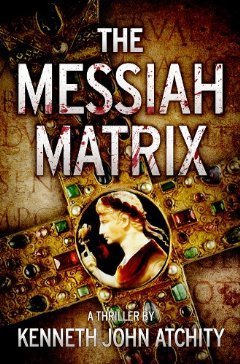
Description: (preview book)
First Jesuit Pope predicted in THE MESSIAH MATRIX!
To what
lengths would the Vatican go to suppress the secret origins of its
power? Current papal politics has made this thriller eerily prophetic!
The Messiah Matrix is a myth-shattering novel whose protagonists delve
into the secrets of the past—and expose the fundamentalists who hide
them still.
A renowned scholar-monsignor is killed in Rome while a
Roman coin is recovered from a wreck off the coast of ancient Judea.
It’s up to his young American protégé--a Jesuit priest--and a vivacious,
brilliant archaeologist to connect these seemingly disparate events and
unravel the tapestry that conceals in plain view the greatest mystery
in the ecclesiastical world. Together they pursue their passion for
truth—while fighting to control their passion for each other. What they
uncover is an ancient Roman imperial stratagem so controversial the
Curiafears it could undermine the very foundations of the Roman Catholic
faith--much like the secrets emerging from the Vatican in today's news.
From
the ancient port of Caesarea to Rome's legendary catacombs and the
sacred caves of Cumae, this contemporary novel follows their
exhilarating quest to uncover the truth about the historical existence
of the real "Christian Savior."
Classical scholar and Yale Ph.D.
Dr. Kenneth John Atchity is the only author alive today capable of
creating this literary and historically-based spellbinder.
For more information on The Messiah Matrix, including location maps, blog and more please visit: www.messiahmatrix.com
________________________________________________________________
Jasius?Who
or what is it? All Google has to offer is a two-tailed butterfly or the
ring finger. Say it again. Jasius. It has the sound of something
strange, yet strangely familiar. Something or someone we all know, yet
infinitely beyond our comprehension. Kenneth Atchity's The Messiah
Matrix explores the mystery in a fast-paced, light-hearted novel that is
at the same time profoundly disturbing.The story goes forward at three
levels. At the top, a rousing twenty-first century adventure that moves
from the wrecks littering the floor of the Mediterranean to the
corridors of the Vatican. Below that, a carbon-dated epigraphic
revisionist history of the first centuries BCE and CE. And, at the
deepest level, a sympathetic, fair-minded rational re-examination of
"the greatest story ever told." You may applaud, dispute, chortle, weep,
but you will think about this book long after the final page.-Benedict
and Nancy Freedman, authors Mrs. Mike, Sappho: The Tenth Muse, The
Immortals
In a thriller that rivals anything Dan Brown ever
wrote, The Messiah Matrix threatens to take all your beliefs and toss
them into the wind. A priest is murdered in Rome. His assassin is also
shot and killed while with another priest. A message was delivered. An
artifact is found on the floor of the sea.A Jesuit questions his faith
and the history of his Church.An archaeologist uncovers the find of a
lifetime and loses it.
A connection between Christ and Augustus
Caesar? The wise men following a star in 17 BC?Curiouser and curiouser!
Although you know what they say about curiosity. The Monsignor searching
for the ashes of Christ--which he was killed before explaining. Does
the Holy See condone murder? Damn Skippy it does!
This book is
amazing! The two main characters of Ryan and Emily are the perfect pair
of detectives. Will they be more? You’ll have to read the book!Emily’s
coin is vital to the history of Christianity in the world, but will they
get it back? On the coin, Augustus was wearing a crown with twelve
spikes.What’s up with that?
In this tale we have good guys, very
bad guys, the Holy Mother Church, good priests and very, very bad
priests and one red-headed archaeology professor who, along with one
questioning Jesuit and some of his brothers, may be able to solve the
conundrum that is The Messiah Matrix.
--Cheryl's Book Nook

Published on August 25, 2013 14:49
The Messiah Matrix - BookBub Today's Deals - FREE UNTIL 8/29/2013

Today's Deals

An Affair of Vengeance
By Jamie Michele
Someone murdered undercover agent Evangeline’s parents…
and they’re not going to get away with it. Can mysterious gangster Oliver
McCrea help her get revenge? “A hot, hard-edged spy thriller” (USA Today)
$1.99
Originally:
Get
Deal:
Amazon
Deal ends: 8/31/13
Category: Thrillers

The Messiah Matrix
By Kenneth John Atchity
Fans of Dan Brown’s The Da Vinci Code will love
this controversial thriller. When a beloved priest is assassinated and an
ancient artifact is uncovered, can young Jesuit Ryan and brilliant
archeologist Emily get to the bottom of a vast conspiracy?
Free!
Originally:
Get
Deal:
Amazon
Deal ends: 8/29/13
Category: Thrillers

Zoo Station
By David Downing
On the brink of World War II, journalist John Russell
writes an article that puts him in the crosshairs of both British and Nazi
operatives. With over 130 five-star reviews on Goodreads, this international
bestseller “will have readers holding their breath” (Publishers Weekly)
$1.99
Originally:
Get
Deal:
Amazon Apple Barnes & Noble Kobo Sony
Deal ends: 8/30/13
Category: Bestsellers

Published on August 25, 2013 14:25
August 24, 2013
Lila French's Short Selected for 2013 New Orleans Film Festival
BIRDBATH has been selected to
screen at the
2013 New Orleans Film Festival!
:) :) :) :) :)

The festival will take place October 10-17th, 2013 (screening
schedule TBA).
I'm so excited to be able to screen my debut film in my awesome home
town!!! Not only do I have a ton of family and friends there, but also
many of those who supported the film through Kickstarter are there! (Thank
you again, Kickstarter supporters, for taking a chance on me and this
project. Now I have (some) credibility!)
Also, the gritty/artsy style of the film and the story of a struggling
artist trying to make it in the city are perfectly suited to New Orleans.
Not to mention the jazz score.. AND the version of the film to be screened
is the FULL film with the WORLD'S
GREATEST CLOSING CREDITS SONG (an original arrangement of a
jazz standard tailored for the film and beautifully played by live
musicians)!
I can't wait! If you ever wanted to visit New Orleans... might I suggest October 10-17, 2013...
:)
You can join me for the world's most fun thing, which is riding the train
through City Park and waving to everyone in the park and having them wave
back. (Try it, you'll see.)
See y'all in NOLA in Octobah,
Lila :D
birdbathshortfilm.com
facebook.com/birdbathshortfilm
twitter.com/birdbathfilm

screen at the
2013 New Orleans Film Festival!
:) :) :) :) :)

The festival will take place October 10-17th, 2013 (screening
schedule TBA).
I'm so excited to be able to screen my debut film in my awesome home
town!!! Not only do I have a ton of family and friends there, but also
many of those who supported the film through Kickstarter are there! (Thank
you again, Kickstarter supporters, for taking a chance on me and this
project. Now I have (some) credibility!)
Also, the gritty/artsy style of the film and the story of a struggling
artist trying to make it in the city are perfectly suited to New Orleans.
Not to mention the jazz score.. AND the version of the film to be screened
is the FULL film with the WORLD'S
GREATEST CLOSING CREDITS SONG (an original arrangement of a
jazz standard tailored for the film and beautifully played by live
musicians)!
I can't wait! If you ever wanted to visit New Orleans... might I suggest October 10-17, 2013...
:)
You can join me for the world's most fun thing, which is riding the train
through City Park and waving to everyone in the park and having them wave
back. (Try it, you'll see.)
See y'all in NOLA in Octobah,
Lila :D
birdbathshortfilm.com
facebook.com/birdbathshortfilm
twitter.com/birdbathfilm

Published on August 24, 2013 00:00
August 23, 2013
Design Your Novel to Be a Film

Novelists seeking representation complain that none of their books have been made into films. At any given moment, we have literally stacks of novels from New York publishers on our desks in Los Angeles. Going through them to find the ones that might make motion pictures or television movies, we—and other producers, managers, and agents--are constantly running into the same problems:
“There’s no third act…it just trickles out.”
“There are way too many characters & it’s not clear till page 200 who the protagonist is.”
“I can’t relate to anyone in the book.”
“At the end, the antagonist lays out the entire plot to the protagonist.”
“There’s not enough action.”
“There’s nothing new here. This concept has been used to death.”
“We don’t know who to root for.”
“The whole thing is overly contrived.”
“There’s no dialogue, so we don’t know what the character sounds like.”
“There’s no high concept here. How do we pitch this?”
“There’s no real pacing.”
“The protagonist is reactive instead of proactive.”
“At the end of the day, I have no idea what this story is about.”
“The main character is 80, and speaks only Latvian.”
“It’s set in Papago…in the 1960s, and is filled with long passages in Uto-Aztecan.”
“There are no set pieces.”
Of course anyone with the mind of a researcher can list a film or two that got made despite one of these objections. But for novelists who are frustrated at not getting their books made into films that should be small consolation and is, practically speaking, a useless observation. Yes, you might get lucky and find a famous Bulgarian director, who’s fascinated with the angst of octogenarians, studied pacing with John Sales or Jim Jarmusch, and loves ambiguous endings.
But if you regard your career as a business instead of a quixotic crusade, you should be planning your novel from the outset to make it appealing to filmmakers.
Give us a strong (preferably male) lead who, good or bad, is eminently relatable—and who’s in the “star age range” of 35-50 (where at any given moment 20 male stars reside; a star being a name that can set up the film by his attachment to it).
Make sure a dramatist looking at your book will clearly see three well-defined acts: act one (the setup), act two (rhythmic development, rising and falling action), and act three (climax leading to conclusive ending).
Express your character’s personality in dialogue that distinguishes him, and makes him a role a star would die to play.

Published on August 23, 2013 00:00

